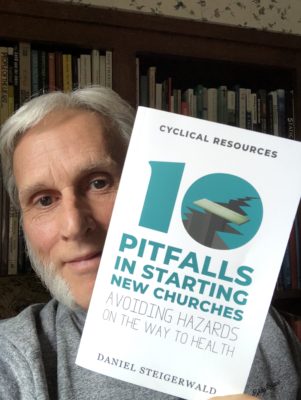Adjusting Our Coaching to Match Present COVID-19 Realities
As one who coaches professionally, I’ve observed how my interactions with clients, most of them pioneering leaders or church starters, have been changing due to COVID-19. Here’s some of what I’ve been noticing that’s proving helpful in many of these coaching relationships, and I’d welcome hearing the thoughts of others who also regularly coach pioneering leaders and pastors:
1. In this cultural moment, do recognize how important it is to coach the whole person. Most of our clients are steeped in the heaviness of the times, which means we need to up our game in terms of paying attention – on a lot of levels. This requires us to maintain a posture of patient “along-sided-ness,” where we listen deeply, speak sparingly, and console generously. Many of our clients are reticent to bring up even short-term aspirations or strategies these days, as they really crave processing the emotions, demands and struggles immediately upon them. Our probing questions and in-the-moment discernment with a given client may help feed a thirst to drink from familiar and untapped springs of vitality and motivation. And such deeper veins pulsate into the entirety of a client’s being, so they’re worth helping a client tap into.
A wise Master Coach friend recently began a demonstration session by asking the coachee a question we all might want to use nowadays as a stage-setter for coaching the whole person (i.e. employ it as an opening question at the start of a coaching session): “Is there anything you’re carrying into our conversation today that you’d like to acknowledge or let go of?” That question in itself may elicit quite a strong response worth probing into – even in the role play above, the person wearing the client hat was visibly stirred by the question and moved into processing some real-life, deep stuff. Or, the question might simply serve to clear the deck for a more focused conversation on other priorities important to the client.
Whatever surfaces in those opening moments of our sessions, I recommend we test our coachee’s readiness to respond to the distressed emotions or troubling issues they express. The pressures of these unique times can dig at the soul and expose some deep stuff – performance anxiety issues, anger, shame, addictive or escapist behaviors, etc. While some of the deeper roots of these issues may be best addressed through the client seeking counseling or therapy, it’s particularly important that we cultivate the safety in relationship conducive to vulnerable, raw sharing. So, if a client wants to unpack what’s going on inside them, do your best to grace them with the space to vent. And, try to remind yourself in the moment not to press the conversation too hastily toward solution-finding or actions. This may feel counter-intuitive, but keep in view the reality that today’s pressures do provide a healthy stimulus for leaders to get after heart matters that have been too long untended.
In general, I find coaching the whole person involves moving beyond the normal field of discussing vocational aims and goals to exploring more holistic developmental goals. I like SOULeader’s (www.souleader.org) way of giving attention to six primary areas, as this approach helps insure a more full-orbed undergirding of a client’s leadership formation. To become what SOULeader’s founder, Michael Bischof, calls a “whole leader,” we need to help leaders give attention to growth in six key formational areas:
a. Relational formation (social)
b. Emotional formation (feelings)
c. Spiritual formation (heart)
d. Mental formation (mind)
e. Missional formation (will)
f. Physical formation (body)
I encourage coaches to develop their own questions related to each of these formational areas. Here’s some more generic formational questions I find my clients are frequently “inviting” me (i.e. giving me cues) to ask, especially in these times:
- Which of the six formational areas (above) need the most attention for you right now? What goals would you like to set for yourself in those neglected or dormant aspects of your formation?
- What spiritual practices or activities might you engage to keep you centered in the moment, and not overly preoccupied with the future?
- What are you finding life-giving in this time, and how will you carry that forward into the fall (e.g. new family rituals, living more simply, walking in silence, etc.)?;
- What activities/behaviors do you find depleting or life-stealing in this time? And how will you work to minimize their influence going into the fall (e.g. looking at the news too much, comparing on social media, feeding addictive behaviors, etc.)?
Employ formational questions like these regularly, especially in these moments where entrepreneurial leaders and pastors have to bear so many additional stresses. For an excellent article on the application of Bischof’s six formation approach in a time of crisis, see: https://converge.org/point-magazine/story/may-2020/six-gauges-for-your-soul-in-a-time-of-crisis.
2. Helping a client to undergird not only their personal formation and interior shalom is critical in these times, but the other side of the formational coin also involves helping them give sufficient attention to strengthening their “social base.” Social base refers to the leader’s support net, that web of relationships and resources from which the leader draws to sustain their calling at any given moment.¹ This includes the ecosystem of one’s home life, social connections, personal finances, etc.
During this COVID-19 crisis, it’s easy to imagine how compromised this ecosystem that fuels our coachee’s journey can become. These points of vulnerability are extremely important to dig into as a coach, as they can present huge drains in terms of both immediate impact and also cumulative impact over time. Here’s some questions you as a coach might ask:
- What are you doing to cultivate joy, playfulness and light-heartedness within your close-in social web or bubble?
- How are you making extra provision to undergird your family’s or significant others’ health and well-being in these depleting times?
- Where do you need to cultivate additional income streams for your family or social unit, and how might you do that in ways complementary to your project?
- How are you enlisting your base of intercessory pray-ers and personal financial supporters (if you’re self-funded) in these times?
Though a team leader’s team is not generally part of this social base category, there are close crossovers that lend to its second level inclusion as a key social net. Coaches need to help their clients proactively fuel the vitality and well-being of their fellow teammates. In these times of high change and stress, questions like these may be helpful:
- How would each of your team members describe what they’re feeling/experiencing personally? How could you creatively enable them to express that?
- What does each team member need from you and the rest of the team at this time? How do you find that out? And how can you keep the ball in the team’s court to collectively address heavier needs?
3. Most coaches encourage their coachees to self-assess their growth needs or preferences through some version of a “coaching wheel.” This is a graphic tool that generally focuses on a set of life roles and developmental areas to which a coachee must give attention in order to support their well-being.² If a sponsoring agency is underwriting the cost of the coaching, the wheel will often include growth areas that not only relate to the coachee directly but also to the success metrics of the sponsor.
In this period of high change and uncertainty, I find it’s important to encourage my clients to occasionally revisit and update any multi-angle self-assessment they have done to determine arcs/lines for coaching. Assuming they’re able to adequately attend to self-development and the undergirding of their social base, they may find it very helpful to consider all the roles they presently assume in life, and then choose those they feel need the most attention in the next six months ahead.
In a time demanding a lot of creative pivoting by pioneering leaders, some of our coachees may desire to look afresh at their vocational roles, and in doing so, they suddenly are extremely interested in getting a fresh read on their strengths, their core values, or how they operate in relationships and team environments. Assessment tools, such as the Strengthsfinder assessment, the enneagram, and the EQi-2.0 (measuring emotional intelligence factors) may be worthy suggestions in this season, especially since these tests usually provide some interpretive report to the client. I find that coaching into such self-awareness tools can really help particular clients find more satisfactory ways of working out their calling and serving within team environments.
4. Typically, I’m pressing my coachee to dig in the fields of their relationships and networks and base of written and online resources to discover helpful ideas, approaches, trainings, best practices, etc. that might serve their needs or the needs of their team. Cohorts or communities of practice involving other leaders in a similar boat as our coachee can be a superb well of practical helps for leaders, and I’m often encouraging a given coachee to look well beyond their grassroots ideating for just-in-time resources within these circles.
It’s important to note that if there’s ever a danger zone for hi-achievers to over-function, it’s now! To help prevent that, we as coaches can continually be asking our coachees questions like these that help them shift parts of their leadership load to other appropriate parties:
- What key decisions or tasks do you bear the primary weight of? Which ones of these can be wisely delegated?
- Who can you groom or count on right now to shoulder some of the responsibility that you need to offload?
Essentially, we’re trying to help the leader we’re coaching to more robustly collaborate to tap into relationships and resources conducive to their (and their project’s) survival. We aim for this in our coaching at all times, but, given the pressures of COVID and this cultural moment, I do think we need to put on the mentor hat much more often than we normally do, especially if we know the road of church startup very well. As a coach, we may have some vital suggestions to offer when a client finds themselves in a make-it-or-break-it, desperation moment – and I believe the frequency of such moments will be rising in the year ahead!
Of course, we each have to learn to wisely discern when and how to deliver input when a given client is in an unusually tight spot. And that will almost invariably mean we seek permission to offer suggestions (the exception perhaps being in rare moments that demand our immediate direct communication). In certain situations when a starter seems to be severely discouraged or bogged down, or their project’s survival appears to be in jeopardy, I will, without much hesitation, resort to mentoring. I personally think this is wise and in the best interest of the client, especially if we are well-versed or have deep experience in church startup dynamics. But, in most situations, I try to use impartation sparingly. And, I’ve learned that asking these kind of questions helps me hold the mentoring reflex at bay:
- Where are you currently seeing signs of fruit or momentum? How does that progress relate to your priorities? How might you cultivate in ways consistent w/ your vision?
- What have you tried before when faced with a similar challenge?
- Who might you talk to that’s done something similar, and what resources or training events might you access that could help you answer that question?
- If a friend were in your shoes right now, what advice would you offer them?
- What does your gut and your praying tell you is the best thing you might do? Where does God seem to be working or inviting you?
Finally, if you discern it wise to wear the mentor hat for a moment, I’d say, first of all, it’s good practice to offer several suggestions, and then ask your client to choose which one(s) they want to act on. Secondly, I encourage you, coach, not to heap guilt upon yourself when temporarily shifting from the drawing-out posture with which we’re so familiar. Some degree of regular impartation comes with the territory in the strategic coaching of church starters, and I’m convinced it’s even more necessary in this crucible season.
5. Last (and certainly not least) of all, I’m finding that in this cultural moment it’s critically important to help our coachees adjust their metrics or how they measure success. And this applies to the setting of their formational goals (as per the six areas above), as well as those aspects of their social base and whatever else appears on their version(s) of the coaching wheel (vocational roles, sponsoring agencies growth categories, etc.). Of course, such measures of progress will need some serious reinterpreting or postponing during this pandemic. For many leaders, just getting through the week ahead intact is a win. So the progress horizon will be very short term, but I still recommend asking a given coachee what they would like to see happen in terms of critical priorities, followed by: “And how will you know you’re making progress? What signs would you expect to see to verify that?”
In my experience, the setting of useful progress targets is not something the body of Christ does very well. We tend to set fuzzy or poorly discerned progress metrics, or we rely on supervising agencies or leaders to whom we report to set the metrics. As to the latter, sponsoring agencies do need to weigh in with their desired metrics, but the focus should be much more strongly skewed toward helping teams on the ground discern their own progress targets.
And this takes us to what constitutes a decent metric. First of all, it should situate itself within a clearly articulated, hoped-for outcome. That statement can be somewhat general, but don’t let the coachee stop there. Take them to the next step and help them develop SMART (Specific, Measurable, Achievable, Relevant and Time-bound) goals around that desired future outcome. And finally – perhaps most importantly – help the coachee unpack each progress target by answering “as evidenced by…” This gets them thinking of concrete ways to actually evaluate or gauge progress, rather than simply naming generic targets like “I will be a leader who better demonstrates the Galatians 5 fruits of the Spirit.”
Here’s some questions you might ask to help leaders set good metrics for progress in the short term:
- What are some of the outcomes you hope to achieve in these next 5 months?
- Which ones are most important and demanding of more attention (i.e. your priorities in rank order)?
- How will you measure progress toward your most important priorities? What evidences would you expect to see if you achieved or moved significantly closer to those goals?
- What actions might you set for yourself to see those evidences emerge?
- Who will help you stay accountable to your progress goals, and when, specifically, will you as a team evaluate how you’re doing?
In conclusion, this brief excursion through the five segments above represents my observations in coaching more than a dozen starters during the rocky pandemic period. Of course, I’m also drawing upon my experience over a couple decades in coaching church planters, who commonly have at least one crisis on their hands at any given moment. The use of any line of questioning related to the five areas I’ve delineated assumes, of course, that we’re paying attention to the cues our coachee offers that invite such questions. And I’m also assuming that coaching starters is a sacred, Spirit-informed endeavor, where we as coaches continually join our coachees in the sensitive work of communal discernment. These are unusually hard times, and to some extent, this may be the new normal for quite some time. May you, as a coach who loves Jesus, keep your heart pliable and your skills sharp so that you might be just the kind of person needed to serve starters in this wild era ahead.
———-
- This phrase “social base” is derived from Dr. J. Robert Clinton’s work on leadership emergence theory. Clinton argues that the emotional, strategic, economic support and relational environment out of which we minister is key to both sustainability, health and fruitfulness.
- For an excellent example of a coaching wheel and how to use it, see the free Coaching Manual put together by the 1001 New Worshipping Communities team in the Presbyterian Church of American (PSUSA): https://www.presbyterianmission.org/wp-content/uploads/1001-Coaching-Manual.pdf
- I have written a piece on some of the nuances that I (and a good number of other coaches with which I’ve consulted) have observed in coaching church planters versus standard coaching (see link below). In this document I give more extensive attention to this practice of strategic coaching, which does employ a much more impartational stance by the coach to supplement coaching along the International Coaching Federation’s (ICF’s) newly revised 8 competencies. Here’s the link:
https://www.linkedin.com/in/dan-steigerwald-3b561b7/detail/overlay-view/urn:li:fsd_profileTreasuryMedia:(ACoAAAFWVXkBETy2kmc-WGg7j0k07uZkv8YwI78,1585877783510)/



